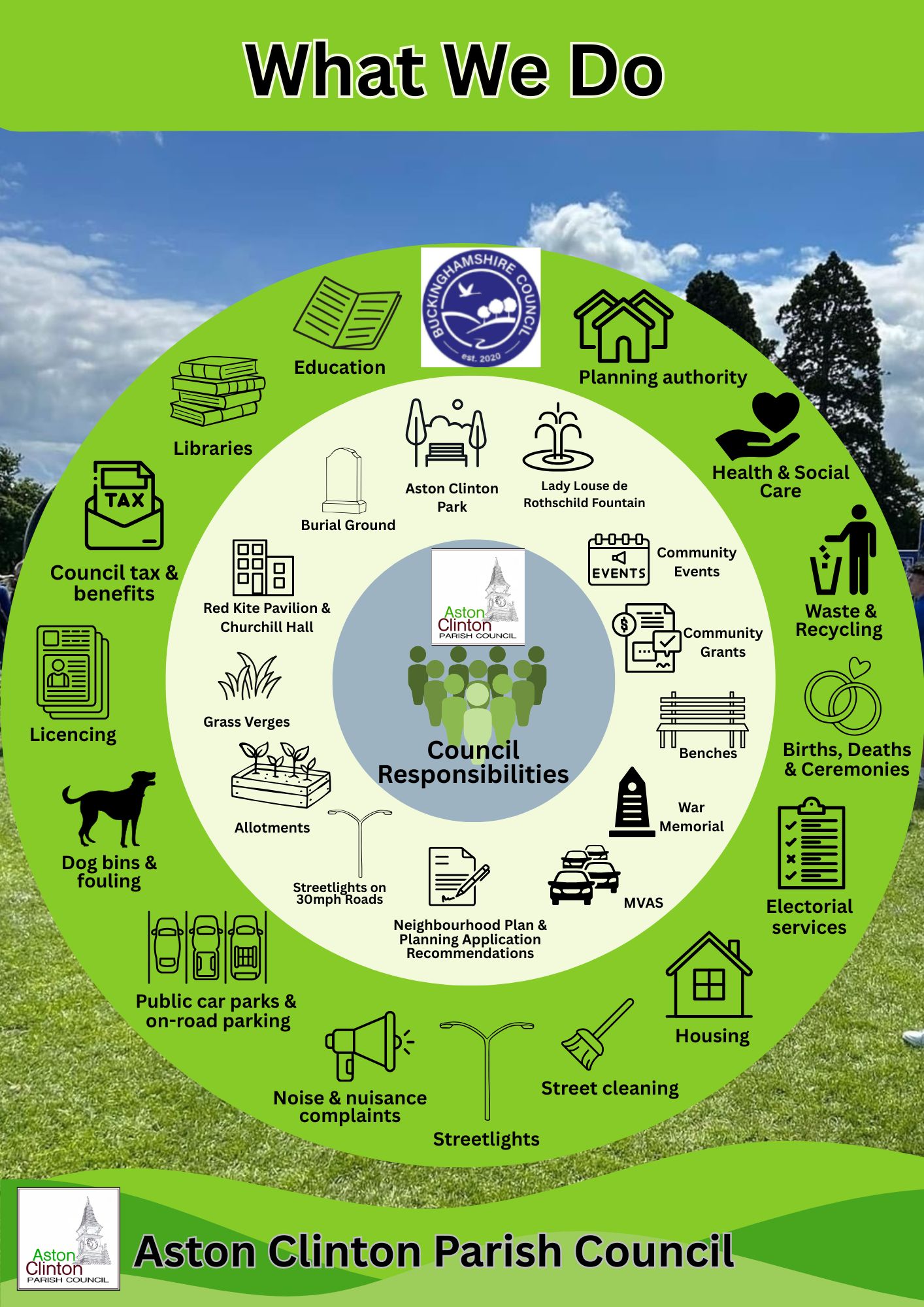Council

There are two tiers (or levels) of local government in Buckinghamshire. This means there are two councils working for Aston Clinton.
- Buckinghamshire Council is a unitary authority with responsibility for services across the county
- Aston Clinton Parish Council is the parish council for Aston Clinton
Aston Clinton Parish Council has 11 Councillors who have been elected by the local community. Parish Councillors are people who live or work in the parish and give their time voluntarily, without payment.
What do Parish Councillors do?
Town/Parish Councils make up the first tier of local government in England and are the layer of local government closest to the communities they represent. The Parish Council sets a proportion of local taxes to be spent in the Parish, comments on planning applications in the Parish and run projects that help maintain, improve or enhance the local area. Local Government is changing and Parish Councils are seeing an increase in the responsibilities and opportunities to influence decisions made that affect our local community.
The Council is a corporate body with a legal existence of its own quite separate from that of its members. The decisions of the parish council are the responsibility of the whole body.
The Clerk to the Parish Council is the proper officer in law, employed by the Council and is also the Responsible Financial Officer.
Aston Clinton Parish Council hold the General Power of Competence and this allow us to do more in the village. The General Power of Competence give Councils the power to do anything an individual can do if it is not prohibited by other legislation.
Local Government Association document on the General Power of Competence
What Powers Do Parish Councils Have?
They have a wide range of powers which essentially related to local matters, such as looking after community buildings, open space, allotments, play areas, street lighting, bus shelters, car parks and much more. The council also has the power to raise money through taxation, the precept. The precept is the parish council’s share of the council tax. The precept demand goes to the billing authority, the district council, which collects the tax for the parish council.
What Decisions Do Parish Councils Make?
Parish councils make all kinds of decisions on issues that affect the local community, but predominately identifies, campaigns and delivers better services and facilities for its residents and visitors
Our work falls into three main categories: • Representing the local community • Delivering services to meet local needs • Striving to improve the quality of life in the local area.
We provide, maintain or contribute to a number of services including: Parks and open spaces; allotments; leisure facilities; bus shelters; planning; crime reduction measures; events and celebrations; traffic calming measures; and many more!
It’s true to say that on their own, parish councils have limited powers to make decisions. But they do have the ability to negotiate with, and the power to influence, those other organisations that do make the final decisions (such as the unitary council, health authorities, police etc.).
In this respect parish councils are extremely powerful. The organisations that make the final decisions know that a parish council gives the best reflection of how a community feels about something, and its views will be taken seriously.
Regulations Governing the Parish Council
The conduct of the Parish Council’s business is governed by our Standing Orders. Download a copy of ACPC’s Standing Orders Updated May 2025. These cover the conduct, timings and documentation of meetings; the engagement and employment of the Parish Clerks; and the financial management of the Parish Council, also covered by the Parish Council's Financial Regulations updated in April 2025
All Members are obliged to comply with Aston Clinton Parish Council’s Code of Conduct.
Data Protection
The General Data Protection Regulation (GDPR) came into force on 25th May 2018. The GDPR is supplemented by the Data Protection Act 2018 replacing the earlier 1998 Act. GDPR provides a higher standard of privacy to individuals and affects the way in which we can contact you and manage your personal data. ACPC Data Protection Policy and ACPC Privacy Notice
Freedom of Information
The Freedom of Information Act gives you the right to ask any public sector organisation for all the recorded information they have on any subject. Anyone can make a request for information – there are no restrictions on your age, nationality or where you live. You can contact the Parish Council directly by letter or email to make the freedom of information (FOI) request. When making your request, you should include:
- Your name;
- An address where you can be contacted;
- A detailed description of the recorded information you want.
Most requests are free but you may be asked to pay a small amount for photocopies or postage if paper copies are requested. Please click on the link below for further information.
ACPC Freedom of Information Publication Scheme reviewed July 2024
Making a Complaint
Aston Clinton Parish Council recognises that from time to time there will be concerns expressed by members of the public over the activities of the Council, one of its councillors or employees. Our Complaints Procedure sets out how you may make a complaint and how the Council will try to resolve your complaint. ACPC Complaints Procedure reviewed February 2025.